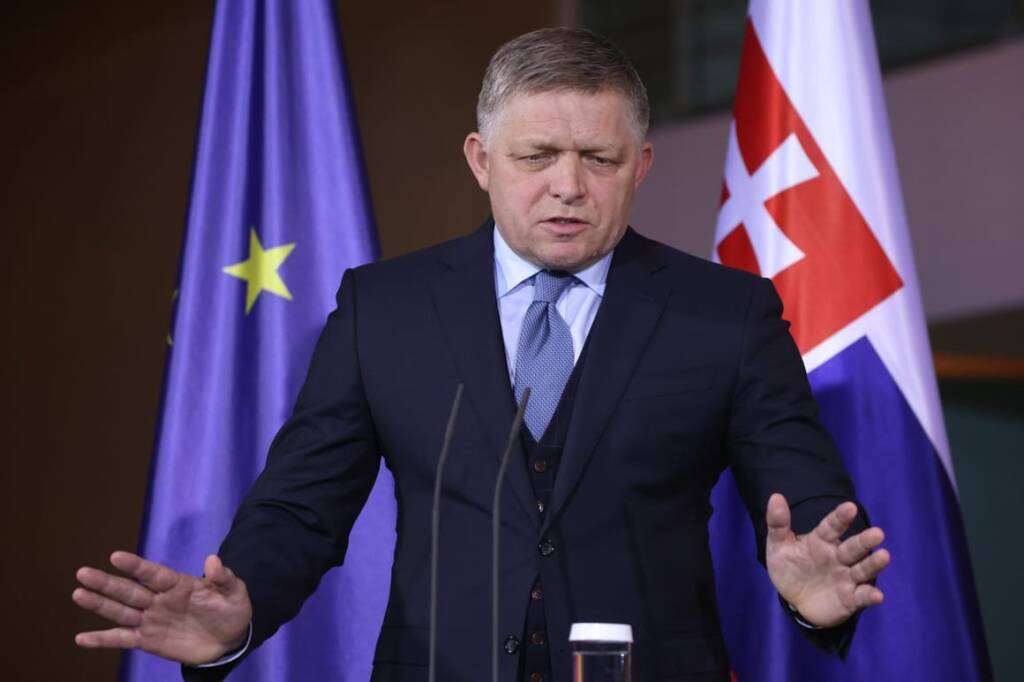Robert Fico is a smart man and he has warned NATO in no uncertain terms. Will NATO heed his advice or jump in the inferno?
Robert Fico, the Prime Minister of Slovakia, just issued a dire warning through a video on social media, suggesting that deploying European Union and NATO troops to Ukraine might lead to a global catastrophe. This statement coincided with the meeting of the Slovakian foreign minister and his Russian counterpart, Sergey Lavrov. Fico pointed out the ineffectiveness of Ukraine in ending the conflict despite receiving extensive financial and military support from the West. He stressed that the presence of EU and NATO forces in Ukraine could drastically change the conflict’s nature, potentially setting the stage for catastrophic outcomes.
“The West sees that, despite significant financial and military aid, Ukraine is incapable of resolving this armed conflict,” Fico remarked. He further cautioned that the introduction of EU and NATO military personnel in Ukraine could precipitate a scenario where the world would merely await a global apocalypse. Additionally, Fico emphasized the urgent need for advanced air defense systems in Ukraine but highlighted the impracticality of providing such systems without assurances of their maintenance and operation. He maintained that the deployment of Western military forces would exacerbate rather than ameliorate the conflict.
Join us on Telegram: https://t.me/tfiglobal
On February 27, during a conference of European leaders, French President Emmanuel Macron had articulated a stance that did not exclude the deployment of troops from Western allies to Ukraine, alongside announcing a coalition aimed at delivering missiles to the Ukrainian Army. Macron emphasized the lack of current consensus on deploying ground troops in an official capacity but noted that future dynamics might open possibilities for such actions.
Slovak Prime Minister Robert Fico, prior to a significant meeting in Paris involving EU and NATO national leaders, voiced concerns over potential military deployments to Ukraine by several member states. Citing a “restricted document” with discussion topics for the Paris meeting, Fico expressed alarm over implications that some NATO and EU countries are contemplating troop deployments on a bilateral basis, although the specifics of such missions remained undefined.
Read More: Orbán and Fico have made converts out of Czech Republic and Poland
Fico criticized the meeting in Paris as evidence of the West’s failing strategy in Ukraine. Macron’s statements, intended as a firm deterrent to the Kremlin, inadvertently highlighted divisions within the West, showcasing the disparity in views among European leaders.
Notably, German Chancellor Olaf Scholz led the faction opposing Macron’s insinuation that NATO had not dismissed the idea of troop deployment, with Washington distancing itself from Paris’s proposition, resulting in Macron bearing the brunt of the controversy.
A survey conducted across 12 European Union countries, initiated by the European Council on Foreign Relations and released on February 21, indicates a pervasive skepticism regarding Ukraine’s prospects in the conflict with Russia. A mere 10% of those surveyed believe in Ukraine’s potential victory, while only 31% support the notion of Europe assisting Ukraine until it reclaims lost territories. A more significant portion, 41%, advocates for Europe to encourage Ukraine to engage in peace negotiations with Russia.
In contrast to the stance of many European leaders, Slovak Prime Minister Robert Fico recognizes the improbability of Ukraine’s triumph over Russia. This acknowledgment prompted Fico to dispatch Foreign Minister Juraj Blanar for discussions with Russian counterpart Sergey Lavrov on March 2, alongside a diplomatic forum in Turkey.
Fico described the meeting as a reflection of Slovakia’s balanced and sovereign foreign policy, mentioning that it explored the possibility of a Ukraine peace summit in Switzerland. Blanar emphasized the absence of a military solution to the conflict, advocating for peace negotiations. He communicated to Lavrov Slovakia’s opposition to the creation of an “iron curtain” between Russia and the EU.
Read More: Slovakia vs. EU: Fico’s Explosive Rule of Law Clash!
Returning to power in 2023, Fico had campaigned on halting military aid to Ukraine and criticized sanctions against Russia. His recent declarations echo the European Council on Foreign Relations survey’s findings, denouncing the West’s strategy in Ukraine as a failure—a sentiment shared by many EU citizens.
Robert Fico and Victor Orban are cut from the same cloth and recently they converted two more nations away from the Ukraine Madness.
